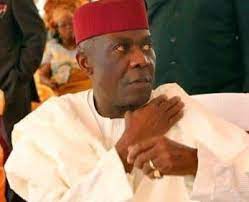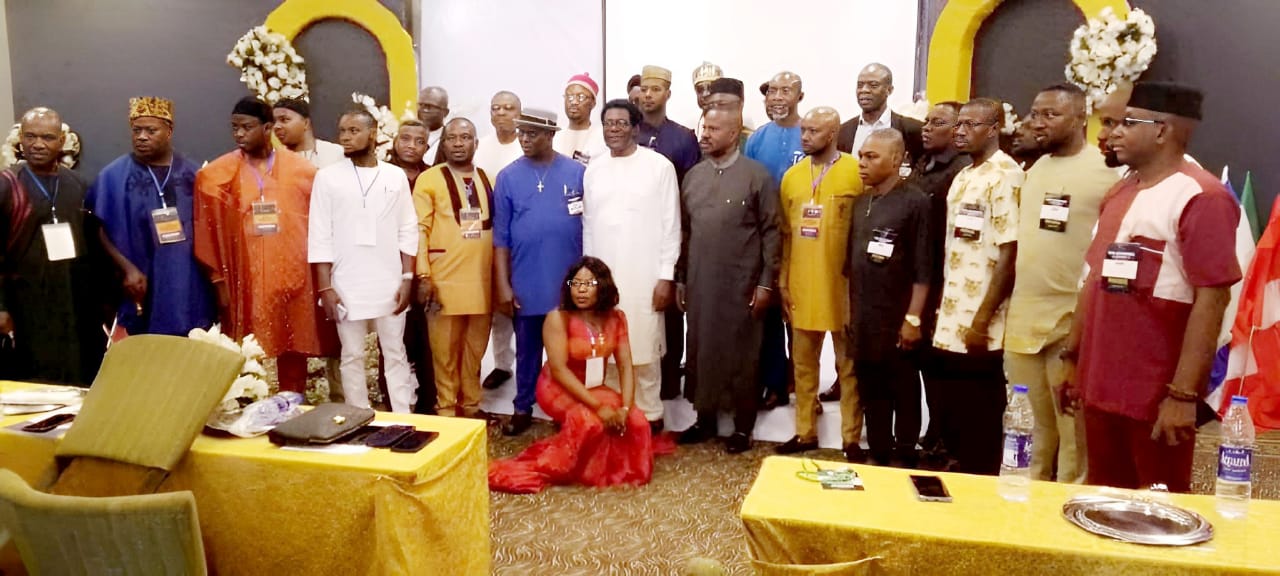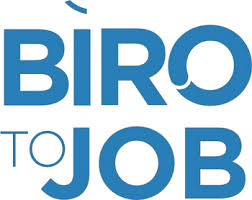OGBUAGU, WERE THESE IN YOUR DAYS

BY ETHELBERT OKERE
Call him the Ariri Eri Mba Ndigbo (The Fellow Who Would Never Allow Ndigbo To Be Humiliated) and you would be perfectly in order. Senator Chief Francis Arthur Nzeribe, who recently passed away in London, was not the noisy politician, playing to the gallery. He was not given to open expression of emotions and sentiments but he never failed to rise to the occasion whenever the collective integrity of his people, Ndigbo, was threatened.
In his active days in politics, nobody, no matter how highly placed, insulted the Igbo and got away with it, even though he might differ from others in his approach. For example, while Senator Nzeribe lived to ensure that Ndigbo kept their head up in Nigeria’s murky waters of politics, he never supported the resort to self-help or lawlessness. Unlike many other politicians, he stood for the truth only, regardless of tribal or sectional proclivities.
It is not uncommon to hear Igbo politicians beat their chests to say: “I am a detribalized Nigerian”. But Senator Nzeribe was not given to such platitudes. Rather, he believed that those who made such claims did so to please other ethnic groups in the country. As far as he was concerned, such talks are one of the major reasons why some sections of the country take others for granted. He believed that it is only when the different sections of Nigeria recognize the fact that Nigerians are, first and foremost, different peoples who have merely agreed to stay together, no matter how imperfect the union might be, that they would try to respect the beliefs, fears and aspirations of each other.
In at least three instances during his life time, Chief Nzeribe, the Ogbuagu, Oshiji, Damanze of Oguta, lived up to that belief. One of such well known instances was over the “June 12” saga, which story is too well known to be repeated in any details here. Suffice it, however, to refresh our minds that Ndigbo gave massive votes to the winner of the June 12, 1993 presidential election, the late Chief Moshood Abiola. As a matter of fact, the Igbo paid a heavy price, in many instances with their lives, during the crisis that surrounded the annulment of that election. But in an irony of fate, the then president-elect, in the heat of the controversy, was reported to have said that he could do without the Igbo. The late M.K.O Abiola was highly revered and loved by the Igbo who, as already noted, gave him massive support. For example, on the day Chief Abiola declared himself president at Epetedo, a Lagos suburb, the two people that flanked him in his immediate left and right where two prominent Igbo – Chief Ralph Obioha and the late Bobo Nwaosisi. Meanwhile, many of his Yoruba kinsmen had either gone into hiding here in Nigeria or scampered abroad for safety.
So, given all that solidarity to Chief Abiola, the Igbo were rudely shocked at the statement credited to him. But two fellows from amongst them who rose in their defence were Chiefs Arthur Nzeribe and Emeka Ojukwu, the Ikemba Nnewi. Chief Nzeribe pointedly told Chief Abiola that for so denigrating his people, he, Abiola, would never be president of Nigeria. As is well known, a rattled Abiola was to scamper to Oguta to see Ogbuagu and in search of peace. Upon getting to Nzeribe’s palatial home, Nkpu Udo (Haven Of Peace), Chief Abiola met the Ikemba Nnewi who had earlier called on Chief Nzeribe in solidarity of his bold and courageous curtailment of Chief Abiola in what was clearly a big insult to Ndigbo; and for both to put heads together on how to ensure that their people did not suffer further physical and emotional assault.
Much earlier before that, the two leaders – Ojukwu and Nzeribe – had been working together to see that their people did not feel further disadvantaged in the Nigerian arrangement. Right from the time Ojukwu returned from exile in 1982, the two went into a robust relationship that completely belied whatever differences they had had between them during the unfortunate Nigerian civil war. The two had no difficulty in coming to terms with the fact that what was more important than those setbacks was how to reposition Ndigbo to face the inclement political weather that was still staring at them more than ten years after the war.
Unfortunately, not many Igbo, including some members of the political elite, know that the two worked so closely together up to the time the Ikemba departed. Even though they were in different political parties in the second republic, the duo maintained a very robust personal relationship and, unknown to many, shared strategies for both for their individual and collective interest of their people. For example, not many would today remember that Ojukwu was in the company of Nzeribe and some of his people in Orlu, Imo state, on the day they went to make a case for the proposed Orashi state, which the latter was at the fore front of, at the National Assembly.
Apart from that Ojukwu found in Arthur Nzeribe a fellow compatriot with whom he could work to advance the Igbo cause, it was not a hidden matter that both shared uncommon personal traits. For example, the two where famous for their knack for keeping to time, attributes they perhaps both garnered while staying abroad at the early stages of their lives. Those who followed Ojukwu closely would attest to the fact that he was always the first to arrive at any occasion he was invited to; a trait which Nzeribe took to the height of a fault.
In the Nigerian senate, Nzeribe’s record as the most punctual senator has remained unbroken. Records also have it that he had the highest number of attendance at plenary. The two leaders were also known for not suffering fools gladly. You wouldn’t go to either of them unsure of what you went for, or to beat about the bush, or to wallow in mere gossips. Rather, every time was, for the two leaders, precious. On the contrary, both Ojukwu and Nzeribe were famous for keeping to agreements and not allow unnecessary waste of time or foot dragging over any issues involving a second party. Both had uncommon flare for details no matter how little the issue was.
The reason why many thought that both men were too strict or fastidious was because of the penchant of the typical Nigerian not keep to agreements. Nigerians take each other and things for granted, and in most cases, they believe that only “serious” matters should be handled with dispatch. But those who knew Ojukwu and Nzeribe well would attest to the fact that for both, every issue, especially if it involves a second or third party, is important. The second occasion where Chief Nzeribe showed a rare passion for his people was during the musical chair saga in the fourth senate. It is possible that most of those who are today posting commentaries on the social media about the late senator were either too young to know or out for mischief most probably on the prompting of others.
It happened that the then senate president, the late Chuba Okadigbo, had been accused of both inflating contract prices and awarding same to his cronies. Senator Nzeribe was a member of the committee that was set up by the senate itself to look in the matter. At one of the open sessions, Nzeribe, not satisfied with some of the information that had been made available to his committee, pointedly asked Okadigbo: “Ole Ka Ndigbo Ketara”.
Remarkably, Nzeribe couched his question in Igbo (and which on translation into English means: How Much Was The Share Of The Igbo) apparently to alert Okadigbo that he will have some explanation to make to their people if the details got out there. Nzeribe’s question cum remark became proverbial and kept coming up each time Ndigbo gathered in Abuja or anywhere outside Igbo land, to talk about matters concerning their welfare.
Needless to say, Senator Nzeribe had, knowingly and unknowingly, reawakened the Igbo consciousness that they were – and still are – not getting a fair deal in Nigeria. It is possible that some might argue that he did that at the expense of the career of a fellow Igbo but that was Arthur Nzeribe, a man who stood for the truth regardless of whose ox is gored. In any case, it is not a hidden matter that Ndigbo have themselves accused their fellow kit and kin of either connivance or outright collaboration with outsiders to deny them of a fair share of the collective patrimony.
Several years after that saga, the Igbo are still vulnerable to the tendency of their own people to place their individual or group interest over and above that of the generality of the people. Today, there is so much frenzy over a Nigerian president of Igbo extraction. It is something Senator Nzeribe very much craved for even though he remained of the opinion that his people were yet to adopt the right strategy to achieve it. He quarreled with what he referred to as “Calendar Mentality” which, he argued, was why Ndigbo kept claiming at every election season that it is their turn. Nzeribe once asked: “It was our turn in 1999. It was our turn in 2003. It was our turn in 2007. It was our turn in 2011. When will it no longer be our turn”. This is the type of question he would have been asking today especially as events of late tend to suggest that the 2023 “turn” may, after all, be a mirage. The way things are going, we may end up with another “I Can Do Without The Igbo”. Now that Arthur Nzeribe is no more, who will put out his hand to say: “Let’s Bet”



